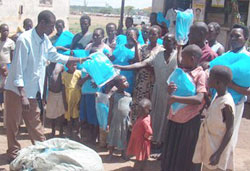Sustainability key to malaria fight
March - April, 2009 | Volume 8, Issue 2

Photo by Charles D. Humphrey, CDC
New insecticide-treated mosquito nets are distributed
to women and children in the Lira district of Uganda.
Fogarty recently convened a consultation of top government experts to encourage smoother coordination of efforts in the fight against malaria in sub-Saharan Africa.
Dr. Bernard Nahlen, the deputy director of the President's Malaria Intiative (PMI), agreed with Center Director Dr. Roger I. Glass that there is cause for optimism. "We are moving ahead," Nahlen said. "The first couple of years demonstrated success in making sure the money was being used effectively, and it bought us a lot of good will with Congress."
Nahlen called the session "important to the understanding of what NIH does, what CDC does and how we can actually work within the spirit of the congressional language" creating PMI, which requires interagency consultation and a recognition of the role of research in the battle against malaria.
The consultation involved program staff from Fogarty, PMI, the U.S. Agency for International Department (USAID), the Centers for Disease Control and Prevention (CDC), National Institute of Allergy and Infectious Diseases (NIAID), National Institute of Child Health and Human Development (NICHD) and the National Library of Medicine (NLM).
The Initiative was created by President Bush and began operations in three countries in 2006, eventually expanding to 15, where it provided preventive and treatment services to more than 25 million people in the first two years.
PMI operates in many of the African countries where Fogarty sponsors research training: Ethiopia, Kenya, Madagascar, Malawi, Mali, Senegal, Tanzania, Uganda and Zambia plus Angola, Mozambique, Rwanda, Benin, Ghana and Liberia.
"The prospect of addressing malaria has never been brighter," Glass said. But he cautioned the key to success is "sustainability" in five areas: training scientists locally, creating data information systems, increasing research capacity, delivering supplies and maintaining economic benefits of malaria control.
Nahlen suggested a sixth area - political commitment in the PMI countries not to abandon short-term successes to divert resources elsewhere only to find the disease re-emerging later.
More Information
To view Adobe PDF files,
download current, free accessible plug-ins from Adobe's website.